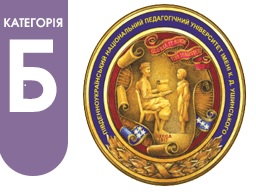Issue № 4. 2024 р.
Download the issue as one file
SECTION 1. THEORY AND HISTORY OF POLITICAL SCIENCE
Naumkina S. M., Manasaryan A. B.
“Human rights” in scientific and public discourses
SECTION 2. POLITICAL INSTITUTIONS AND PROCESSES
Bakhmetiev A. Ye.
Blogging as a modern means of political communication
Vovk S. O., Bader A. V.
The multifactorial impact of the war on Ukrainian society and citizens of Ukraine: a systematic analysis of political, social, psychological and economic components
Voichuk A. Yu.
The emergence and development of German parliamentarism
Honcharenko Ye. S.
Problems of regional media development in wartime Ukraine
Gorokhovsky D. I., Zienkin M. V.
Evolution of the Ukrainian political system after independence
Davydenko O. P.
The system of territorial organization of government in Poland: experience for Ukraine
Kobetіak A. R., Kirushok Yu. V.
The role of the Orthodox Churches in the Euro-integration processes: Romania’s case
Matukhno H. R.
Institutional structure and peculiarities of normative regulation as factors of functioning of youth policy institutions:
problem-prospective dimension
Nazarov M. S., Limonko A. O.
Overview of the state policy of Ukraine on ensuring resilience at the level of regions and territorial communities
Nazarchuk O. M.
The evolution of the paradigm of intersectoral interaction in the context of the optimal model for Ukraine
Svekla K. A.
E-voting technologies: the political and communication dimension
Chigidin V. V.
Political representation in Ukraine: dynamics of democratic changes
Shymanova-Stefanyshyn O. V.
The influence of political communication on state-building processes in Ukraine
SECTION 3. POLITICAL CULTURE AND IDEOLOGY
Lisyansky P. L.
The use of the educational process by authoritarian regimes as a tool for ideological subjugation of the population
SECTION 4. POLITICAL PROBLEMS OF THE INTERNATIONAL SYSTEMS AND GLOBAL DEVELOPMENT
Antoniuk N. V., Kraievska O. A.
Institutional structure of the European Union: formal and political framework
Buriachenko O. V.
International security crisis: evolution of NATO in the context of the Russian-Ukrainian war
Gurbanzada Fakhri Siyavush oglu
The influence of pull factors in the migration process (case of Germany)
Dmytrashko S. A.
Values and practice of the diplomatic activity of H. Kissinger
Zavada Ya. I., Salo A. V.
The main areas of cooperation between China and Iran in the 21st century
Zinchenko O. I.
Political issues in the development of cyberterrorism in the international space
Ilnytska U. V.
Humanitarian strategies of the foreign policy of the European Union: update in the context of security challenges and threats
Marusynets M. M.
The problems of emigration in the Republic of Ireland and the development of the Irish diaspora in the world
Myloserdna I. M.
Information security as an element of national security: theoretical dimension and implementation features
Parkhomchuk O. S., Koppel O. A., Parkhomchuk A. D.
Artificial intelligence as a megatrend: new horizons in global politics and international relations
Hidayatova S. A.
Strategic shifts: the transformation of China-Russia relations from cold war to present
Cherednichenko A. H.
The policy of Taiwan’s neighboring states as a factor in deterring conflict escalation
Iastrebova V. A.
The participation of separatist movements in the creation of quasi-state entities in the post-Soviet space
SECTION 5. ETHNO-POLITICAL SCIENCE AND ETHNO-STATE STUDIES
Babayeva G.
Armenıan occupatıon actıons agaınst Azerbaıjan and attempts to deceıve the world (1990s)
Kokodziei Ye. V.
Assessment of the European experience of multiculturalism policy: historiography of the problem
Madryha T. B.
Participation of Crimean Tatars in the political life of Ukraine after the annexation of Crimea
Shpachenko Ya. B.
Ethnocultural autonomy: characteristics of the historiography of the problem









